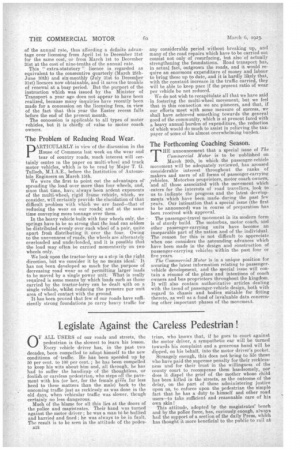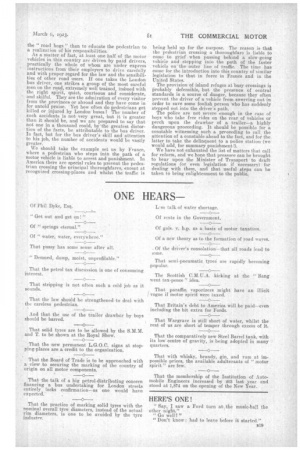Legislate Against the Careless Pedestrian !
Page 2

Page 3

If you've noticed an error in this article please click here to report it so we can fix it.
OF ALL USERS of our roads and streets, the pedestrian is the slowest to learn his lesson. Every vehicle driver has, in the past two decades, been compelled to adapt himself to the new conditions of .traffic. He has been speeded up by 50 per cent. to 100 per cent. ; he has been compelled to keep his wits about him and, all through, he has had to suffer the handicap of the thoughtless, or foolish or careless pedestrian, who steps off the pavement with his (or her, for the female git-74s far less heed to these matters than the male) back to the oncoming traffic just as recklessly as was done in the old days, when vehicular traffic was slower. theugh certainly no less dangerous.
Much of the blame for all this lies at the doors of the pollee and magistrates. Their hand was turned against the motor driver ; he was a man to be bullied and harried and fined ; he was always to be in fault.. The result is to be seen in the attitude of the pedes n18
trian, u-ho knows that-, if he goes to court against the motor driver, a sympathetic ear will be turned towards his complaint and a generous hand will be dipped, on his behalf, into the motor driver's pocket.
Strangely enough, this does not bring to life those who have paid the supreme penalty for their recklessness and for their trust in the willingness of the county court to recompense them handsomely, nor does it dispel the grief of the mother whose child has been killed in the streets, as the outcome of the delay, on the part of those administering justice upon us, to enforce upon the pedestrian the simple fact that he has a duty to himself and other road users—to take sufficient and reasonable care of his own skin!
This attitude, adopted by the magistrates' bench and by the police force, has, curiously enough, always had the support of a section of the daily Press, wh/ch has thought it more beneficial to the public to rail at the " road hogs" than to educate the pedestrian to a realization of his responsibilities. As a matter of fact, at least one half of the motor vehicles in this country are driven by paid drivers, practically the whole of whom are under express instructions from their employers to drive carefully and with proper regard for the law and the sensibilities of other road users. If one takes the London bus driver, one strikes a group of the most careful men on the road, extremely well trained, imbued with the right spirit, quiet, courteous and considerate, and skilful. They are the admiration of every visitor from the provinces or abroad and they have come in for untold praise. Yet how often do pedestrians get killed or injured by London buses? The number of such accidents is not very great, but it is greater than it should be, and we are prepared to say that not one in a thousand could, by'the greatest distortion of. the facts, be attributable to the bus driver. In fact, but for the bus driver's skill and attention to his job, the number of accidents would be vastly greater.
We should take the example set us by France, where a pedestrian who steps into the path of a motor vehicle is liable to arrest and punishment. In America there are special rules to prevent the pedestrian crossing the principal thoroughfares, except at recognized crossing-places and whilst the traffic is being held up for the purpose. The reason is that the pedestrian crossing a thoroughfare is liable to come to grief when passing behind a slow-going vehicle and stepping into the path of the faster vehicle on' the outer line of traffic. The time has come for the introduction into this country of similar legislation to that in force in France and in the United States.
The provision of island refuges at busy crossings is Probably defensible, but the presence of central standards is a source of danger, because they often prevent the driver of a vehicle from swerving out in order to save some foolish person who has suddenly stepped out into the driver's path. The police are not severelenough in the ease of boys who take free rides on the rear of vehicles or perch upon the drawbar of a trailer—a highly dangerous proceeding. It should be possible for a constable witnessing such a preceeding to call the attention of a constable ahead to the fact, and for the latter to take the delinquent to a police station (we would add, for summary punishment I). We have not exhausted the list of matters that call for reform, and we hope that pressure can be brought to bear upon the Minister of Transport to draft regulations (or even legislation if necessary) for dealing with them, and that useful steps can be taken to bring enlightenment to the public,




























